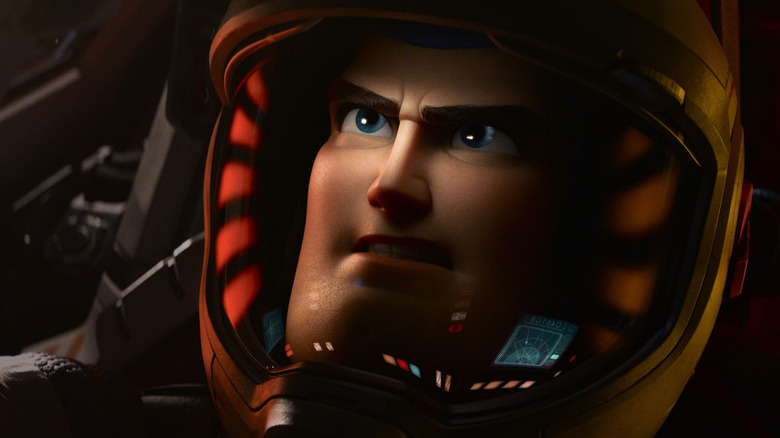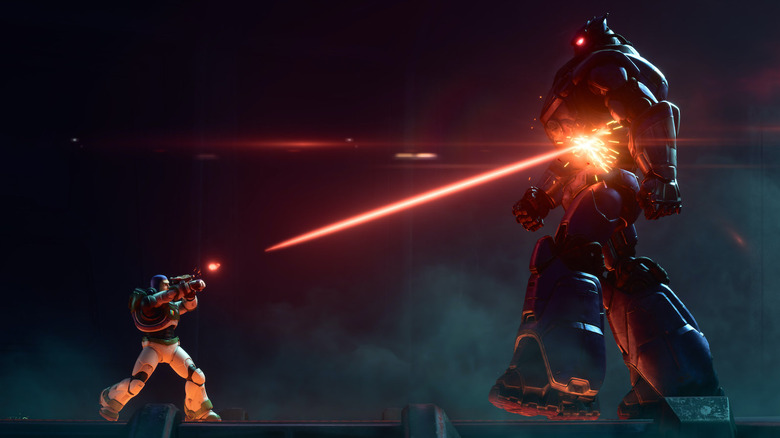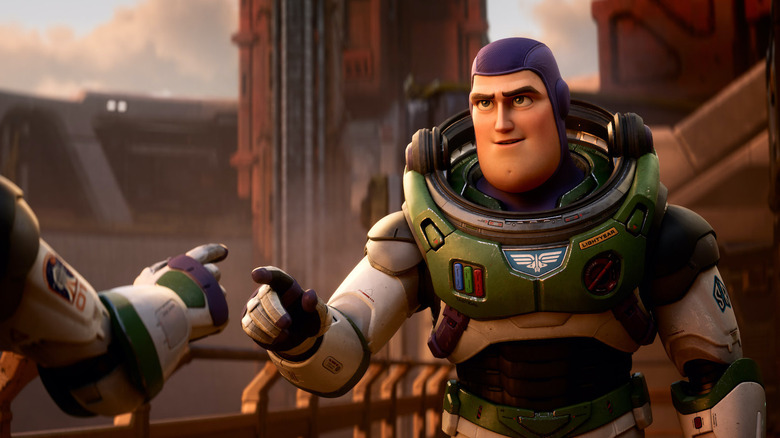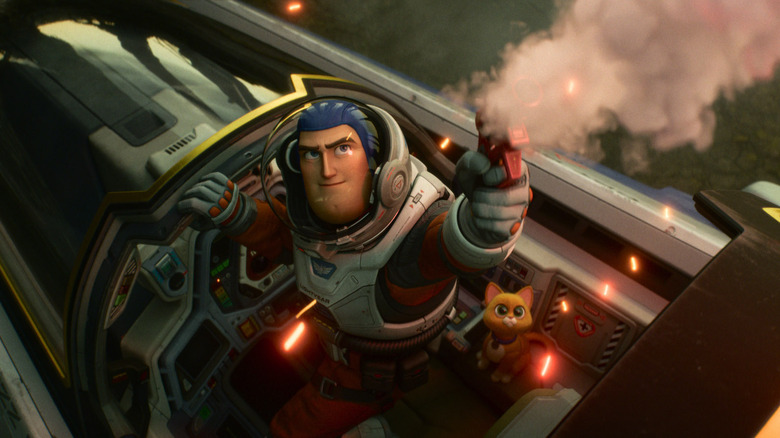Michael Giacchino On The 'Fun Challenge' Of Composing Music For Pixar's Lightyear And More - Exclusive Interview
As one of the most accomplished and prolific composers working in Hollywood today, Michael Giacchino has created the music that's moved us as we've watched movies and TV shows like "Lost," "Spider-Man: No Way Home," and "The Batman." Giacchino is also responsible for the scores for some of Pixar's most beloved animated classics, including "The Incredibles," "Up," and "Inside Out." The Oscar winner has an impressive ability to know exactly how to capture the themes of each movie he's a part of through music, as well as when to include a rousing anthem or a hushed note to back up the action happening on screen. It's talent he displays once more in the music for "Lightyear," a prequel that explains the origins of the "Toy Story" character Buzz Lightyear.
While Buzz (Tim Allen) was a somewhat deluded toy when we met him in 1995 in the first "Toy Story" film, in "Lightyear," he's a real Space Ranger (Chris Evans), and his heroic story required a different sound than the one Randy Newman created for the scores of the four "Toy Story" films. With "Lightyear," Giacchino has composed the kind of music that makes space travel feel thrilling and fun, instilling a sense of awe in viewers while never dismissing the internal struggles of the movie's characters. In an exclusive conversation with Looper, Giacchino discussed how he developed the score for "Lightyear," the movie genre he hasn't written music for but wants to, and how he approaches each project to ensure the scores he creates honors their stories and characters.
Capturing a childhood feeling through music
It's great to talk to you today, Michael. I've been a fan since "Alias."
Oh boy. Early days. That was fun, that show. I absolutely loved working on that show, and that was my first TV show and it opened the doors for so many other things. Getting hired on that show was a huge turning point in my life, thanks to J.J. [Abrams], who plucked me from obscurity and said, "Want to do this?" "Sure. I'll do this." Who could have known?
"Lightyear" includes such stirring themes and heroic touches as well as quieter moments that work really well with the film. How did you go about developing the sound for the movie?
It was more about thinking about the movies that I grew up loving, all the sci-fi and adventure movies that I ate like sugar cereal growing up. It was a way to reflect back on those and understand how they [made] me feel when I was a kid and I was in a theater, and I was like, "I want that feeling for this movie." That's what I want. I want, somehow, for kids today to have the experience I had when I was going to see movies at that age. It's honestly a love letter to everything I grew up with, and it was so wonderful.
Whenever you get a chance to do something where there's no ties to anything else and you can create what you want to do, you go for it. It's such a wonderful challenge and gift to be able to do that, and I felt like this movie gave us that. Even though it was with a character that we knew, it was a different version of that character. It was a different world for that character. It was the real Buzz Lightyear, so we were able to take it in directions that [we] might not have, had we'd been dealing with the actual toy Buzz Lightyear, which is a very different character whom I love as well and who was lucky enough to have had Randy Newman write all his music for him, because Randy is one of the best. It was a fun challenge to go for it and create something fun that came truly from my 12-year-old heart.
Bringing 'something new to something that you think you know'
There are four "Toy Story" films that came before this. Was there anything that you referenced or thought about including from any of them?
No, we couldn't really do that because, again, we were creating something that lived completely outside of the world of "Toy Story." It was about looking at the characters we had in front of us. Who are these people? What are they going through in their lives? And tying everything to that. Nothing was tied to what came before in those other movies. It was all about these people right now, right here, what are they going through and let's tell that story, which then opened up a world of freedom in terms of thematics and, stylistically, the choices that were made. That's always the most fun, as a filmmaker, is to be able to go in and do that, bring something new to something that you think you know. We had a lot of fun doing that.
You've created so many iconic scores. Is there any genre or project that you haven't composed music for yet that you want to?
I probably would love to do an old-fashioned Western of some sort. [That] would be great. I just did a Western with Tom Bezucha called "Let Him Go." Kevin Costner was in it. It took place in the '60s, and I love that movie. It's great. It's a dark, dark tale, and that's about as close to a Western as I have gotten, in terms of a feature film. That would be a fun area to get into.
Approaching every project with the same respect
You've created so many different Pixar scores that are so different and varied. Does your approach, when you're developing a score for an animated movie, differ from when you're doing something for live action?
No, they're exactly the same. The way you got to look at it is: Remy [from "Ratatouille"] is a rat who cooks. Yes, that is not real. It's a real character that was created, but it's not real. Captain Kirk [of "Star Trek"] is the commander of the Starship Enterprise. He is not real either. What you're doing is you're working with stories and characters, and it doesn't matter if it's a live action or an animated thing. The process is the same. I treat them all the same. I treat them as equals. I treat Remy as a real person, and as much as I will dig into Captain Kirk's trauma of growing up and all of this to understand who he is as a person, I will do the same with Remy. I will do the same with Buzz. I will do the same with Carl and Ellie [from "Up"]. I will do the same with Caesar from "Planet of the Apes."
They are all, in my mind, real people that exist and I treat them with that sort of respect. The worst thing you can do is go into a job scoring a cartoon and say, "Oh, it's a cartoon, so I'll score it like a cartoon." No, that is the absolute worst thing you could do, because then you're undercutting the reality of these characters and the emotionality of these characters and what they're trying to say and what they're trying to do with the story. That will completely ruin the whole thing. My approach has always been to treat them as real people, every one of them, because guess what? None of them are real on any side of it. It's all like reading a book and these characters coming to life, bringing them to life in the most respectful way you can.
"Lightyear" opens in theaters June 17.
This interview has been edited for clarity.



